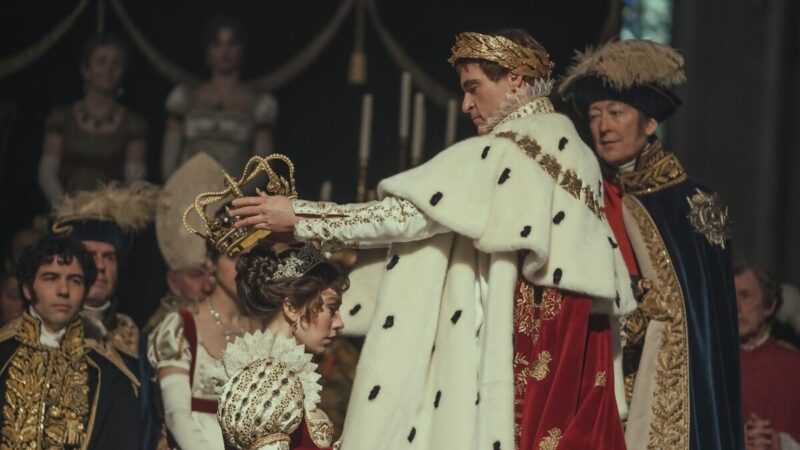
Joaquin Phoenix’s Napoleon is as pathetic as he is brilliant in Ridley Scott’s clinically observed historical biopic. Here’s our Napoleon review.
Everyone – Ridley Scott included – is very cross about Napoleon.
In the press tour for his outwardly dad-friendly biopic, the octogenarian director has upset everyone from historians to the entirety of France. Ever since he said “fruit you” (we think we got that right) to an interviewer and blamed his film’s box office on phone-obsessed millennials while promoting The Last Duel, Scott has only cemented his reputation as Hollywood’s grumpiest – and most active – director.
And why not? On the cusp of his 86th birthday, the man has seemingly made his career making films exactly as he wants them. He’s been written off several times – after G.I. Jane underperformed in 1997, he turned his fortunes around by re-writing the historical epic with Gladiator. When Exodus: Gods And Kings was lambasted in 2014, he made The Martian – to date the highest-grossing film of his career. Scott says and does what he likes because, time and time again, what he says and does has been proved right.
It’s hardly a stretch, then, to see what attracted the director to Napoleon. The most-written-about man in history (“one [book] every week since he died,” according to Scott) is the byword for a brilliant strategic mind. That he achieved his level of renown despite losing the wars which bear his name says something of the way we write and consume the past. History is written by the victors, the saying goes – unless, that is, the loser is named Napoleon.
On first viewing, it’s not hard to see why Napoleon has proved so controversial. Charting the emperor’s life from the execution of Marie Antionette (“Napoleon wasn’t there”, said historian Dan Snow) to his pyramid-blasting conquering of Egypt (“I very much doubt that”) and his death in exile on Saint Helena (bang on, actually), Scott seems to view the great conqueror with a combination of awe and personal scorn. No wonder the French are upset.
Joaquin Phoenix’s title character is more what you’d expect from the actor than the man from a thousand textbooks. From swallowing a panic attack at the Siege of Toulon to starting a shouting match over his fertility in front of his dinner guests, Phoenix is every inch the emotionally stunted man-child we’ve come to expect after his roles in Gladiator, Joker and Beau Is Afraid. Even his un-altered California drawl – typical of Scott’s career-defining disregard for accent geography – marks the Corsican as an outsider amongst a consulate of RP-Frenchfolk.
As more ire to Historians, too, Scott seems broadly uninterested in the method of Napoleon’s rise to power. Soon after Toulon, Phoenix literally falls asleep during a conversation about political strategy. With a slightly disconcerting abundance of time-jumps (apparently to cram in as many cannon-stuffed battles as possible), little time is wasted seeing how Napoleon came to rule France. Only slightly more is even spent asking why.
Instead, Napoleon takes what the audience inevitably knows about Mr Bonaparte for granted. We know he became Emperor of France; we know he was a military genius. While these elements are almost taken as wrote, the rest of the film seems determined to undermine them with the character study of a man-child pining after his wife, Josephine (Vanessa Kirby).

Moments between the couple take up what must be the majority of the film’s runtime. As their relationship flourishes, it’s difficult to see much to like in either. Less an exercise in chemistry and more in bizarrely unerotic lust, their lovemaking is, like a caricature of the man himself, both brutish and short. They seem drawn to each other for reasons neither is capable of expressing, and puts some truth to the notion that Napoleon is a particularly cold film. By the end of a hefty 157-minute runtime, it’s hard to feel much for either of them apart from a faintly amused annoyance – if any of their contemporaries saw the film through some time-bending shenanigans, they’d probably feel more embarrassed for them than anything else.
The missing piece of the puzzle, then, is war. Luxuriating in six extravagantly shot battles, the mass cavalry charges and broadsides of cannon fire have formed the backbone of Napoleon’s marketing campaign for good reason. Once again, Scott has proved that 23 years after Gladiator, he’s still the best photographer of historical violence in Hollywood. The Battle of Austerlitz in particular is astonishingly beautiful in all its icy, horse-sinking glory, but all unfold with a thrilling precision worthy of the legendary tactician himself.
The fact that Napoleon never really strikes a balance between its bedroom and battlefield politics will undoubtedly rub some audiences up the wrong way. But for all the questions Napoleon has thrown up around historical accuracy, the one it most effectively answers might be the one no one seems to be asking: what is the historical epic movie for?
Napoleon takes arguably the most famous man in the history of the world and turns him, not into a villain, but a loser; a fragile, lonely despot with a knack for where to point a cannon who caused the deaths of three million people. By delivering exactly what the audience wants with some astonishing battle sequences, Scott balances the narrative out with a funny, almost boring study of his volcanic private life. It takes the dominant narrative of ‘great man’ history and takes a cavalry sabre to it. ‘Dad cinema’ doesn’t get much better than this.








